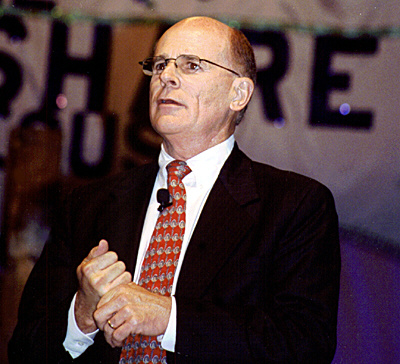General Board of Global Ministries
![]()
UM Information
UM
Reporter
![]()
Florida Southern College
![]()
Bethune
Cookman College
![]()
FL UM Children's Home
![]()
|
|
Special
Edition
|
|
Speakers share experiences of not playing church
By Michael Wacht LAKELAND — Three keynote speakers at the "No More Playing Church" training experience of the Dare to Share Jesus 2000 Florida Annual Conference Event shared how they have moved beyond playing church and developed spiritual and missional attitudes in their own lives and ministries. The Rev. Jessica Moffatt, senior pastor of First United Methodist Church in Bixby, Okla., offered examples of the ministries the laity of her church have developed to reach people beyond the church. It’s done through an intentional program that deploys more than 1,000 church members into the community. The Rev. Dick Wills, pastor of Christ Church United Methodist in Ft. Lauderdale, shared his story of rediscovering his own spirituality and developing spiritual leadership in his church. Although Andrew Young, former ambassador to the United Nations and top aide to Dr. Martin Luther King Jr., was scheduled to open the two-day event, he was called away on an emergency trip to Nigeria, according to Bishop Cornelius L. Henderson. In Young’s place, Henderson invited Dr. Robert Franklin, president of the Interdenominational Theological Center in Atlanta, to address the conference. Franklin spoke on becoming public Christians. Moffatt said playing church is like playing football, with "clergy as the quarterback." She said congregations see their churches’ paid staff as the ministers and applaud as the "clergy runs for a touchdown." "Christians become observers," she said. "We experience the Christian life vicariously. We don’t do mission work, we give to missionaries…we don’t do evangelism, we hire evangelists." The first step in helping a church move beyond its walls is to help church members understand they are "called by God through Christ Jesus and…teach, illustrate and live out the priesthood of all believers," Moffatt said. "What position, possession, passion or preparation can you use in ministry?" The next step is to provide a structure for ministry. Moffatt began at her church by asking church members, "What needs do you see in the city to which you wish this church was in ministry?" Moffatt then urged laity to form ministry groups of four or more people around the ministry areas that most interest them. Those groups, she said, exist for no more than six months, so people do not get burned out. Wills said his experience with playing church involved understanding his calling as a career. "When you come out of seminary, you get a small church with a few sheep," he said. "You add sheep and…you get a bigger place with a better house, more money and more sheep. Eventually, you’re promoted to a place where there are no more sheep." When he arrived at Christ Church in 1986, Wills said he carried that attitude with him. "I worked for five years really hard…and the church starts to grow, but I am weary of trying to do a big church on my own," he said. A trip to the World Evangelism Institute in South Africa reintroduced him to Wesley class meetings and the need for spiritual leadership in the church. After introducing the class meetings to the church, Wills said he "soon saw a spiritual bubbling." Wills then started moving the church’s leaders toward spiritual leadership. "God never gives a vision to a committee," he said, adding God picks one person through whom God reveals a vision and other believers recognize that vision as God’s. Christ Church eventually stopped voting on anything that was not required by the Book of Discipline. "The Bible doesn’t say to vote," he said. "We’re not a democracy. We’re supposed to be a theocracy. It only matters what is God’s will." He says the ministry of the church is entrusted to the laity. "Is someone has an idea, they start it," he said. Lay pastors are consecrated to lead the various ministry groups and communicate with the staff. Franklin defined playing church as "transactional leadership" through which people meet only to exchange valued things. The church, however, needs to be involved in "transformational leadership" and enable all "leaders and followers to raise one another to higher levels of motivation and morality," he said. Church members need to become public Christians. "We need to move outside the bounds of the sanctuary…to the public square where we live the gospel of Jesus Christ," Franklin said. "We need to find a way into the public domain and find the voice of what Christianity is in a modern world." Franklin challenged attendees to help others encounter God, model concern for "God’s larger and fragmented creation," celebrate the variety of cultures in their communities and find ways to link people who are different into an extended family relationship. Top
of this page |

